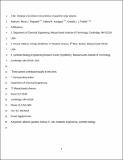Modular and selective biosynthesis of gasoline-range alkanes
Author(s)
Sheppard, Micah James; Kunjapur, Aditya Mohan; Prather, Kristala L
DownloadPrather_Modular and selective.pdf (2.251Mb)
PUBLISHER_CC
Publisher with Creative Commons License
Creative Commons Attribution
Terms of use
Metadata
Show full item recordAbstract
Typical renewable liquid fuel alternatives to gasoline are not entirely compatible with current infrastructure. We have engineered Escherichia coli to selectively produce alkanes found in gasoline (propane, butane, pentane, heptane, and nonane) from renewable substrates such as glucose or glycerol. Our modular pathway framework achieves carbon-chain extension by two different mechanisms. A fatty acid synthesis route is used to generate longer chains heptane and nonane, while a more energy efficient alternative, reverse-β-oxidation, is used for synthesis of propane, butane, and pentane. We demonstrate that both upstream (thiolase) and intermediate (thioesterase) reactions can act as control points for chain-length specificity. Specific free fatty acids are subsequently converted to alkanes using a broad-specificity carboxylic acid reductase and a cyanobacterial aldehyde decarbonylase (AD). The selectivity obtained by different module pairings provides a foundation for tuning alkane product distribution for desired fuel properties. Alternate ADs that have greater activity on shorter substrates improve observed alkane titer. However, even in an engineered host strain that significantly reduces endogenous conversion of aldehyde intermediates to alcohol byproducts, AD activity is observed to be limiting for all chain lengths. Given these insights, we discuss guiding principles for pathway selection and potential opportunities for pathway improvement.
Date issued
2015-11Department
Massachusetts Institute of Technology. Department of Chemical EngineeringJournal
Metabolic Engineering
Publisher
Elsevier
Citation
Sheppard, Micah J., Aditya M. Kunjapur, and Kristala L.J. Prather. “Modular and Selective Biosynthesis of Gasoline-Range Alkanes.” Metabolic Engineering 33 (January 2016): 28–40.
Version: Author's final manuscript
ISSN
1096-7176